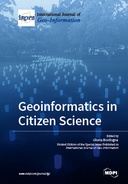Explore

The book features contributions that report original research in the theoretical, technological, and social aspects of geoinformation methods, as applied to supporting citizen science. Specifically, the book focuses on the technological aspects of the field and their application toward the recruitment of volunteers and the collection, management, and analysis of geotagged information to support volunteer involvement in scientific projects. Internationally renowned research groups share research in three areas: First, the key methods of geoinformatics within citizen science initiatives to support scientists in discovering new knowledge in specific application domains or in performing relevant activities, such as reliable geodata filtering, management, analysis, synthesis, sharing, and visualization; second, the critical aspects of citizen science initiatives that call for emerging or novel approaches of geoinformatics to acquire and handle geoinformation; and third, novel geoinformatics research that could serve in support of citizen science.
This book is included in DOAB.
Why read this book? Have your say.
You must be logged in to comment.
Rights Information
Are you the author or publisher of this work? If so, you can claim it as yours by registering as an Unglue.it rights holder.Downloads
This work has been downloaded 587 times via unglue.it ebook links.
- 242 - pdf (CC BY-NC-ND) at Unglue.it.
Keywords
- Air Pollution
- air quality estimation
- Alaska
- Algorithms
- Analysis
- brown marmorated stink bug
- Citizen science
- classification accuracy
- Clustering
- community mapping
- crowdsourced data collection
- crowdsourced geoinformation collection and analysis
- Crowdsourcing
- data analysis
- Data fusion
- data import
- Data quality
- digital cartography
- Education
- ensemble
- Environmental niche modeling
- Geoinformatics
- geoinformation in citizen science
- GIS
- GIS education
- land administration systems
- latent class analysis
- location-based social networks (LBSNs)
- marine mammal
- MaxEnt
- OpenStreetMap
- opportunistic data
- Pentatomidae
- positional accuracy
- projects survey
- QGIS
- recruitment
- Sample Size
- sky images
- Social media
- social relationship effect
- spatial accuracy
- spatial bias
- spatial proximity
- toponym
- user preference
- VGI
- VGI in citizen science
- volunteer
- volunteer geographic information
- Volunteered Geographic Information (VGI)
Links
DOI: 10.3390/books978-3-03921-073-2Editions


